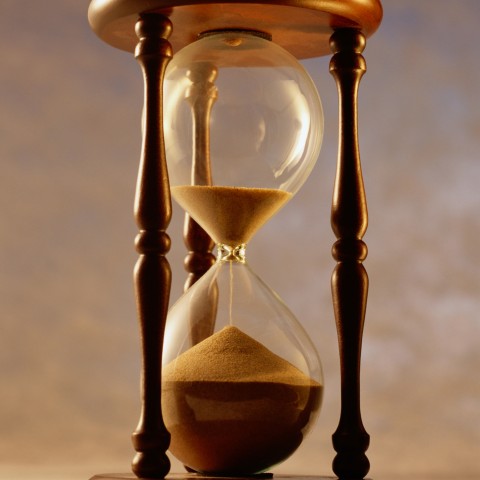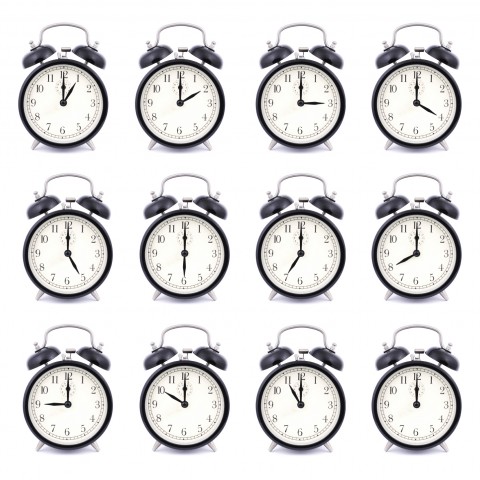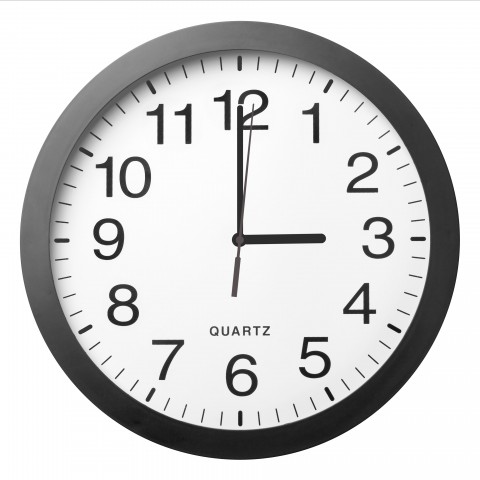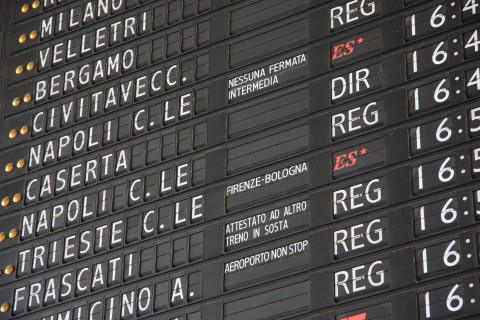
What’s your relationship with the clock like? Does it run your day from a morning alarm to a cut-off chime for bed, or are you more of a go-with-the-flow type, letting your mood and emotions decide how much you fall in line with time?
Understanding time in Portuguese is an important part of your studies. As humans, our lives are filled with habits and schedules. From waking up and going to work or gym, to missing rush hour traffic on our way home, we’re always aware of time. We have routines around coffee breaks, meetings, soccer games and vacations. In fact, time can seem rather capricious – going slowly, going fast, sometimes against us, other times on our side – like a force that has a life of its own.
In science, time is often referred to as a fourth dimension and many physicists and philosophers think that if we understood the physics of the universe, we would see that time is an illusion. We sense an ‘arrow’ or direction of time because we have memories, but really time is just a construct that humans have created to help make sense of the world.
On the other hand, poets through the ages have written impassioned thoughts about time, depicting it as both a relentless thief and an immensely precious resource, not to be wasted at any cost.
Well, poets and scientists may have their views, but in our everyday lives there’s the question of practicality, isn’t there? I mean, if you have plans and want things to happen your way, there’s a certain amount of conforming to the human rules of time that you can’t avoid.
In ‘The Little Prince’ by Antoine de Saint-Exupéry, the prince has a rose that he falls in love with, and he tenderly protects it with a windscreen and places it under a glass dome on his tiny planet. I love this quote from the book: “It is the time you have wasted for your rose that makes your rose so important.” If we truly love something, we spend time with it and not a second of that time could ever be seen as wasted. I feel that way about horses, my children, travel and learning languages.
With that in mind, I’d like to take you on a journey into ‘time’ from a Portuguese perspective. It’s fun, it’s informative and it’s a basic necessity if you’re learning the language – especially if you plan to travel. PortuguesePod101 has all the vocab you need to fall in love with telling time in Portuguese, and not a minute will be wasted.
 Table of Contents
Table of Contents
1. Talking about Time in Portuguese
As a traveler, your primary need for knowing how to read the hour in Portuguese will be for transportation schedules: the bus, train, airplane, ferry, taxi… whatever you plan to use to get from A to B, it won’t wait for you! Fortunately, it’s really not complicated. You already have a firm grasp of time in English and you know you’ll need to reset your watch and phone to the local time. Great – that means you’ll have the correct time on your person.
We’re so used to just looking at our phones for the time, that it’s easy to take this convenience for granted and forget some travel basics: in a foreign country, times won’t always be written digitally. If you see the time written in words, it’ll be the same challenge to you as hearing it spoken: you’ll need to be familiar with the language.
You may be surprised at how often ‘time’ comes into conversation. Learning the Portuguese terms for time will help you when you have to call a taxi, ask about opening and closing times of events and tourist attractions, restaurants and bars and even late-night food cafes.
My biggest annoyance when traveling is not being able to get coffee and amazingly, even at nice hotels this has happened more times than I care to think about. I’ll be up late planning something, writing my blog or chatting and when I go looking for coffee downstairs, I’m told the kitchen is closed or the ‘coffee lady’ has gone to sleep. Frustrating!
If you’re doing a homestay or at a youth hostel or backpackers, there will probably also be a limited timeframe for when you can grab dinner. Do you know how to ask when it’s time to eat in Portuguese? I’ve learned that it’s vital to know how to make my queries clearly understood to accommodation staff and for me to clearly understand their answers. Perfect your ‘time in Portuguese’ translations early on – you’ll thank me.
At PortuguesePod101, we’ve put together a comprehensive list of Portuguese time words and phrases to get you going.

1- Morning – manhã
Morning is the time when we wake up from our dreamworld, hopefully fully rested and restored; we brew the first delicious cup of coffee for the day and watch the sunrise as we prepare for another glorious twelve hours of life. No matter what happened the day before, a new morning is a chance to make everything right.
I like these quiet hours for language practice, as my mind is clear and receptive to learning new things. I start by writing the Portuguese time, date and word of the day on my whiteboard, then get back under the covers for an engrossing lesson.
Time in the morning is written as AM or A.M., which stands for ante meridiem – meaning ‘before midday’ in Latin.

2- Evening – noite
Evening is the part of night when we’re still awake and doing things, winding down from the day. Whether you enjoy a tasty international dinner with friends, go out to see a show, or curl up on the couch with a Brazilian snack and your favorite TV series, evening is a good time to forget your worries and do something that relaxes you. If you’re checking in with your Facebook friends, say hi to us, too!
Evening is also an ideal time to catch up on your Portuguese studies. The neighbourhood outside is likely to be quieter and time is yours, so grab a glass of wine or a delicious local tea, and see what’s new on your Mac App or Kindle.
3- Daytime – dia
Daytime is defined as the period from early morning to early evening when the sun is visible outside. In other words: from sunrise to sunset. Where you are in the world, as well as the season, will determine how many daylight hours you get.
Interestingly, in locations north of the Arctic Circle and south of the Antarctic Circle, in summertime the sun does not sink below the horizon within a 24-hour period, bringing the natural phenomenon of the midnight sun. You could only experience this in the north, though, because there aren’t any permanent human settlements south of the Antarctic Circle.
4- Nighttime – noite
Nighttime is all the hours from sunset to sunrise and depending on where in the country you are, people may be partying all night, or asleep from full-dark.
In the same northernmost and southernmost regions where you can experience a midnight sun, winter brings the opposite phenomenon: the polar night. Can you imagine a night that lasts for more than 24 hours?

5- Hour – hora
An hour is a unit of time made up of 60 minutes and is a variable measure of one-24th of a day – also defined by geeks as 3 600 atomic seconds. Of all the ‘time’ words we use on a daily basis, the hour is the most important, as time of day is typically expressed in terms of hours.
One of the interesting methods of keeping time that people have come up with is the hourglass. Although the origins are unclear, there’s evidence pointing to the hourglass being invented around 1000 – 1100 AD and one of the ways we know this, is from hourglasses being depicted in very old murals. These days, with clocks and watches in every direction we look, they’re really only used symbolically to represent the passage of time. Still – a powerful reminder of our mortality and to seize the day. In his private journal, the Roman emperor, Marcus Aurelius, wrote: “You could leave life right now. Let that determine what you do and say and think.”

6- Minute – minuto
Use this word when you want to say a more precise time and express minutes in Portuguese. A minute is a unit of time equal to one sixtieth of an hour, or 60 seconds. A lot can happen in the next 60 seconds. For example, your blood will circulate three times through your entire vascular system and your heart will pump about 2.273 litres of blood.
7- O’clock – hora
We use “o’clock” when there are no minutes and we’re saying the exact hour, as in “It’s two o’clock.” In Portuguese, this is essentially the same as saying “hour.”
The term “o’clock” is a contraction of the term “of the clock”. It comes from 15th-century references to medieval mechanical clocks. At the time, sundials were also common timekeepers. Therefore, to make clear one was referencing a clock’s time, they would say something like, “It is six of the clock” – now shortened to “six o’clock”.
We only use this term when talking about the 12 hour clock, though, not the 24 hour clock (more on that later!) The 12-hour clock can be traced back as far as Mesopotamia and ancient Egypt. Both an Egyptian sundial for daytime use and an Egyptian water clock for nighttime use were found in the tomb of Pharaoh Amenhotep I. Dating to c.1500 BC, these clocks divided their respective times of use into 12 hours each. The Romans also used a 12-hour clock. Daylight was divided into 12 equal hours and the night was divided into four watches.
These days, the internet has made it very easy to know what the time is in any part of the world. Speaking of which, why not add the Portuguese time zone clock to your laptop?

8- Half past – e meia
When the time is thirty minutes past the hour, in English we say “half past”. Just like the hour, the half-hour is universally used as an orientation point; some languages speak of 30 minutes before the hour (subtraction), whereas others speak of 30 minutes after the hour (addition).
9- AM – da manhã
As mentioned earlier, AM is the abbreviation of the Latin ante meridiem and means before midday. Using ‘AM’ as a tag on your time simply tells people you’re speaking about a time in the morning. In some countries, morning is abbreviated to “AM” and you’ll see this on shop signs everywhere, announcing the opening hour. A typical shop sign might read something like this:
“Business hours are from 7AM to 6PM.”

10- PM – da noite
PM is the abbreviation of the Latin post meridiem and means after midday. Along with ‘AM’, you’ll usually find ‘PM’ on store signs and businesses, indicating the closing hours. It’s advisable to learn the difference between the two, since some establishments might only have one or the other on the sign. For example, a night club sign might say:
“Open from 10 PM until late.”
11- What time is it now? – Que horas são agora?
Here’s a very handy question you should memorize, as you can use it in any situation where you don’t have your watch or phone on you. This could be on the beach, in a club, or if you’re stuck anywhere with a flat phone battery. It happens at home, so it can happen when you’re traveling!

12- One o’clock – uma hora
One o’clock, or 1 PM, is the average lunch time for many people around the world – at least, we try to get a meal in at some point between midday and 2 PM. In terms of duration, the nations vary: Brazililans reportedly take the longest lunch breaks, averaging 48 minutes, whereas Greece reports an average break of only 19 minutes. Historically, Greeks were known for their very leisurely lunch breaks, so it just goes to show how fast the world is changing. If you’re curious about what to expect in Brazil, try asking our online community about lunch time in Portuguese.
13- Two o’clock – duas horas
In his last days, Napoleon Bonaparte famously spoke of “Two o’clock in the morning courage” – meaning unprepared, spontaneous courage. He was talking about soldiers who are brave enough to tumble out of bed in an instant, straight into action, without time to think or strategize. Do you think you have what it takes? I’m pretty sure all mothers know this feeling!
14- Three o’clock – três horas
3 AM can be perceived as the coldest time of day and is not an hour we want to wake up, but meteorologists will tell you that the coldest time is actually half an hour after sunrise. Even though the sun is peeking over the horizon, the solar radiation is still weaker than the earth’s infrared cooling to space.

15- Four o’clock – quatro horas
Do you know anyone who purposely gets up at 4 o’clock in the morning? As crazy as it sounds, there is something to be said for rising at 4 AM while the rest of the world sleeps. If you live on a farm, it might even be normal for you. I know that whenever I’m staying in the countryside, rising early is a lot easier, because there’s a satisfying reason to do so: watching a sunrise from a rooftop, with uninterrupted views, can’t be beat! It’s also likely that you’ll be woken by a cock crowing, or other animals waking to graze in the fresh pre-dawn air.
In the world of business, you’ll find a small group of ambitious individuals – many entrepreneurs – who swear by the 4 o’clock in the morning rise. I’m not sure I like that idea, but I’d wake up at 4 AM if it was summer and I had my car packed for a vacation!
16- Five o’clock – cinco horas
What better way to signal the transition between work and play than the clock hands striking 5 o’clock? It’s the hour most working people look forward to each day – at least, those who get to stop working at 5 PM. Meanwhile, millions of retired folks are taking out the wine glasses, as 5 PM is widely accepted as an appropriate time to pour the first glass. I don’t know how traditional your families are, but for as long as I’ve been alive, my grandparents have counted down the milliseconds to five o’clock, and the hour is announced with glee.

17- Six o’clock – seis horas
This is the time many working people and school kids wake up in the morning. In many parts of the world, 6 o’clock is also a good time to watch the sunrise, go for a run or hit the hiking trails.
18- Seven o’clock – sete horas
Health gurus will tell you that 7 o’clock in the morning is the best time to eat your first meal of the day, and 7 o’clock in the evening is the time you should eat your last meal. I’ve tried that and I agree, but it’s not always easy!
19- Eight o’clock – oito horas
8 o’clock in the morning is the time that most businesses open around the world, and the time most kids are in their first lesson at school – still full of energy and willing to participate. Interestingly, it’s also the time most babies are born in the world! In the evening, 8 o’clock is many young children’s bedtime and the time for parents to watch the evening news.

20- Nine o’clock – nove horas
It’s good to occasionally sleep late on a weekend and for me, this means waking up at 9 AM. If you’re traveling in Brazil and staying at a hotel, planning to sleep late means politely requesting to not be woken up by room service.
21- Ten o’clock – dez horas
10 o’clock in the morning is a popular time to conduct business meetings, and for first break time at schools. We’re usually wide awake and well into our day by then. But what about the same hour at night? Modern people are often still awake and watching TV at 10 PM, but this isn’t exactly good for us. Experts say that the deepest and most regenerative sleep occurs between 10 PM and 2 AM, so we should already be sound asleep by ten o’clock.
In advertising, have you ever noticed that the hands of the clock usually point to 10:10? Have a look next time you see a watch on a billboard or magazine. The reason? Aesthetics. Somehow, the human brain finds the symmetry pleasing. When the clock hands are at ten and two, they create a ‘smiley’ face and don’t cover any key details, like a logo, on the clock face.
22- Eleven o’clock – onze horas
When I see this time written in words, it makes me think of the hilarious Academy Award-winning very short film, “The Eleven O’Clock”, in which the delusional patient of a psychiatrist believes that he is actually the doctor.
Then there’s the tradition of ‘elevenses’ – tea time at eleven o’clock in the morning. Strongly ingrained in British culture, elevenses is typically a serving of hot tea or coffee with scones or pastries on the side. It’s a great way to stave off hunger pangs before lunch time arrives. In fact, if you were a hobbit, ‘Elevenses’ would be your third meal of the day!
23- Twelve o’clock – doze horas
Twelve o’clock in the daytime is considered midday, when the sun is at its zenith and the temperature reaches its highest for that day; it’s written as 12 noon or 12 PM. In most parts of the world, though, this doesn’t happen at precisely 12 PM. ‘Solar noon’ is the time when the sun is actually at its highest point in the sky. The local or clock time of solar noon depends on the longitude and date. If it’s summertime, it’s advisable to stay in the shade during this hour – or at least wear good quality sunblock.
Midnight is the other ‘twelve o’clock’, of course. Midnight is written as 12 AM and is technically the first minute of the morning. On the 24-hour clock, midnight is written as 00:00.

2. How to Tell the Time in Portuguese

Using a clock to read the time in Brazil is going to be the same as in your own country, since you’re dealing with numbers and not words. You’ll know the time in your head and be able to say it in English, but will you be able to say it out loud in Portuguese?
The first step to saying the time in Portuguese is knowing your numbers. How are you doing with that? If you can count to twelve in Portuguese, you’re halfway there! We’ve already covered the phrases you’ll need to say the exact hour, as in “five o’clock”, as well as how to say “half past”. What remains is the more specific phrases to describe what the minute hand is doing.
In everyday speech, it’s common to say the minutes past or before the hour. Often we round the minutes off to the nearest five.
Then, there’s the 24-hour clock. Also known as ‘military time’, the 24-hour clock is used in most countries and, as such, is useful to understand. You’ll find that even in places where the 12-hour clock is standard, certain people will speak in military time or use a combination of the two. No doubt you’ve also noticed that in written time, the 24-hour clock is commonly used. One of the most prominent places you’ll have seen this is on airport flight schedules.

Knowing how to tell military time in Portuguese is really not complicated if you know your numbers up to twenty-four. One advantage of using the 24-hour clock in Portuguese, is there’s no chance of confusing AM and PM.
Once you know how to say the time, it will be pretty easy to also write the time in Portuguese. You’re already learning what the different hours and minutes look and sound like, so give yourself some writing practice of the same.
3. Conclusion
Now that you understand the vocabulary for telling time in Portuguese, the best thing you can do to really lock it down is to just practice saying Portuguese time daily. Start by replacing English with Portuguese whenever you need to say the time; in fact, do this whenever you look at your watch. Say the time to yourself in Portuguese and it will become a habit. When learning a new language, the phrases you use habitually are the ones your brain will acquire. It feels amazing when that turning point comes!
To help yourself gain confidence, why don’t you make use of our various apps, downloadable for iPhone and iPad, as well as Android? Choose what works best for you. In addition, we have so many free resources available to supplement your learning, that you simply can’t go wrong. Some of these are:
- Free lessons on iTunes
- A free mini lesson every day with the Innovative Language Calendar.
- Free audio books for lessons on the go.
If you prefer watching your lessons on video, check out our YouTube channel – there are hundreds of videos to browse. For those of you with Roku, we also have a TV channel you can watch.
Well, it’s time for me to say goodbye and for you to practice saying the time in Portuguese. Look at the nearest clock and try to say the exact time, down to the seconds. See you again soon at PortuguesePod101!










